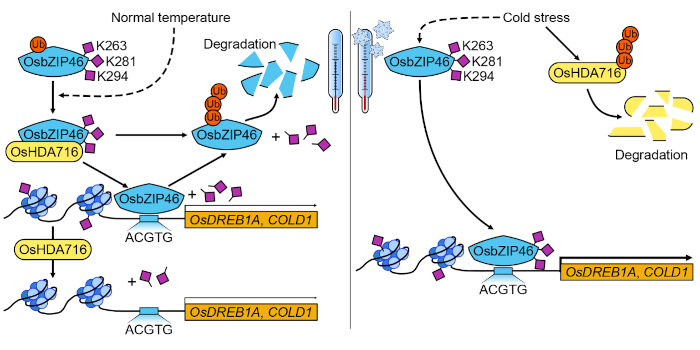OsHDA716-OsbZIP46 regulates cold responses
Sun et al. demonstrate that histone deacetylase OsHDA716 represses rice chilling tolerance not only by functioning as an epigenetic regulator but also by deacetylating OsbZIP46 to reduce its transactivation function and protein stability.
https://doi.org/10.1093/plcell/koae010
By Sun Ying and Huang Junli
Key Laboratory of Biorheological Science and Technology of Ministry of Education, Bioengineering College, Chongqing University, Chongqing 400044, China.
Background: Low temperature is a major environmental factor limiting plant growth and crop production. Epigenetic regulation of gene expression has been suggested to be important for plant adaptation to environmental changes, but the epigenetic mechanism of cold signaling in rice remains largely elusive. Histone deacetylases (HDACs) are generally considered to be recruited to gene promoters, resulting in chromatin compaction and reduced accessibility to the transcription machinery through histone deacetylation. Nevertheless, whether they have histone-independent functions that regulate plant stress responses is largely unknown.
Question: The histone deacetylase OsHDA716 represses rice chilling tolerance and physically interacts with the transcription factor OsbZIP46, a positive regulator of the cold tolerance. Therefore, we ask whether OsHDA716 has non-histone protein deacetylase activity and modulates OsbZIP46 deacetylation, resulting in impaired transactivation function of the transcription factor and thus repressing the chilling tolerance in rice?
Findings: OsbZIP46 confers chilling tolerance in rice through transcriptionally activating OsDREB1A and COLD1 to regulate cold-induced calcium influx and cytoplasmic calcium elevation. OsHDA716 represses rice cold tolerance by interacting with and deacetylating OsbZIP46. OsbZIP46 deacetylation mediated by OsHDA716 reduces OsbZIP46 protein stability and transcriptional regulation of OsDREB1A and COLD1 through preventing OsbZIP46 binding to the target promoters, thus repressing chilling tolerance in rice. Our findings provide important insights into the molecular mechanisms by which HDACs regulate gene transcription, showing that HDACs may have histone-independent functions, and can deacetylate non-histone proteins and thus regulate their biochemical functions.

Next steps: We will study how OsbZIP46 is acetylated and stabilized in response to cold stress, and how OsbZIP46 deacetylation mediated by OsHDA716 reduces protein stability. In addition, whether OsbZIP46 transcriptionally regulates OsHDA716 will be investigated next.
Reference:
Ying Sun, Zizhao Xie, Liang Jin, Tian Qin, Chenghang Zhan, Junli Huang. (2024). Histone deacetylase OsHDA716 represses rice chilling tolerance by deacetylating OsbZIP46 to reduce its transactivation function and protein stability. https://doi.org/10.1093/plcell/koae010



